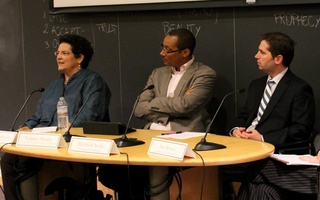{shortcode-2c5be9154f676dfe18ef6487c7b11a1c2d27f67a} UPDATED: November 2, 2015, at 9:40 p.m.
In a discussion about mental health with former Massachusetts Attorney General Martha M. Coakley on Wednesday, College students called on Harvard and student groups to address institutional problems and stigma surrounding mental health on campus.
The University provides a host of mental health resources for students, including professional staff members at Harvard University Health Services and the Bureau of Study Counsel and peer counseling groups. Still, Jennifer Y. Yao ’16, a Student Mental Health Liaison and Crimson multimedia editor, said stigma might prevent students from seeking help.
“Stigma doesn’t just affect people until they get through the door. It affects people all the way through treatment. Ultimately, [stigma] is here at Harvard,” said Kevin Wehmhoefer, a licensed independent clinical social worker at UHS.
In February 2013, an op-ed in The Crimson triggered campus-wide discussion about the University’s mental health resources and policies. Two days later, students protested outside Massachusetts Hall, urging administrators to take action.
Two years later, students said Wednesday, issues persist.
“There are definitely institutional things that need to be corrected,” Eduardo S. Cabral ’16 said at the discussion.
For her part, Coakley said society at large has made strides in recent years toward treating and diagnosing mental health, but that more action is required.
“This meeting wouldn’t have taken place 10 years ago,” she said, adding later that “It’s something that we can tackle in the next 10 or 20 years… It’s a nonpartisan issue. We’ll just have to keep pushing it.”
Coakley also said the stigma surrounding mental health must be addressed for people who suffer from related illnesses to seek out the help they need.
Sara S. Surani ’18 said mental health was stigmatized even before she arrived at Harvard, specifically in the community where she grew up, and she said she continues to see the same stigmatization on campus. “You’re anxious? You didn’t study enough. For depression, it’s ,‘You’re weak,’” Surani said. “People don’t want to get help because that’s admitting that you’re weak.”
Cabral also referenced the stigma attached to mental health issues. “You shouldn’t have to be brave or courageous to tell your story,” Cabral said. “You aren’t brave if you tell someone how you broke your arm.”
The silence that surrounds these issues is also an issue, according to Coakley. “Most people just don’t know what to say about it,” she said.
Coakley argued that overcoming stigma is only one aspect. Mental health issues, she said, “are not some type of martian virus. We know about these things, and we can do better. It’s about where we put our resources.”
The talk, organized by the Institute of Politics and the Phillips Brooks House Association, is part of the IOP’s “Let’s Talk Harvard” campaign, which looks to connect students who are addressing an issue on campus with public figures who address those issues in the public sphere.
This article has been revised to reflect the following correction:
CORRECTION: November 2, 2015
An earlier version of this article incorrectly stated that Jennifer Y. Yao ’16 said Harvard procedures might prevent some students from seeking help for mental health issues. In fact, Yao referred more broadly to barriers associated with seeking help.
Read more in College News
Harvard Students, Cheering and Jeering, Gather for GOP DebateRecommended Articles
-
 Faculty Discuss Experiences as First-Generation Students
Faculty Discuss Experiences as First-Generation Students -
 The Harvard Stigma, Kind of Like the H-Bomb
The Harvard Stigma, Kind of Like the H-Bomb -
An AAPI Perspective: Cultural Roots of Mental HealthThese cultural contexts, which often make it difficult for students to find support among family, may explain the broader status of AAPI mental health.
-
‘Chatroom’ Looks to Start a ConversationThe Harvard-Radcliffe Dramatic Club’s interpretation of the 2005 play-turned-movie will run from Mar. 3 to 6 at the Loeb Experimental Theater. It follows the story of Jim, a depressed teenager who, after failing to find professional help, turns to an online chatroom. Behind the impenetrable veil of the internet, not everyone is who they appear to be.
-
Student Liaisons Host First-Ever Mental Health WeekIn the midst of a hectic reading period, students took a break from cramming for finals by attending mental health-themed events as part of Mental Health Week.













